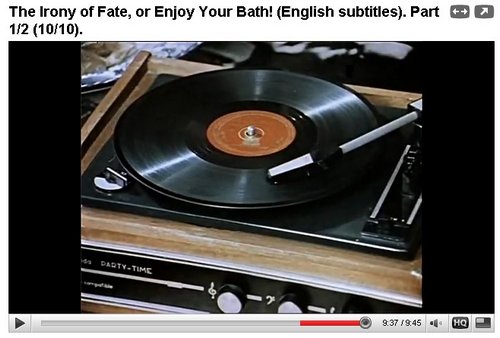 It seems I liked Forgotten Melody for Flute a lot more than the Washington Post reviewer did when the film came out in 1988, during perestroika.  He wrote:
It seems I liked Forgotten Melody for Flute a lot more than the Washington Post reviewer did when the film came out in 1988, during perestroika.  He wrote:
The major attraction of “A Forgotten Tune for the Flute” is its insights into everyday Soviet life. It takes us inside the apartments of privileged bureaucrats and less-well-off nurses and gives us a sense of the Soviet attitude toward cultural reform, careerism and sex. There’s even a glimpse of how Soviet paramedics handle a heart attack emergency. As a glasnost document, it has something of interest to offer; as a movie, it’s a rather drab occasion.
But what kind of movie about life in a bureaucratic system could it be if it was not about drabness?
 I’m pretty sure Eldar Ryazanov was well aware of the drabness of deception and careerism, because why else did he intermix it with the occasional scenes of the pure voices of young innocents who he sent off on a tour?
I’m pretty sure Eldar Ryazanov was well aware of the drabness of deception and careerism, because why else did he intermix it with the occasional scenes of the pure voices of young innocents who he sent off on a tour?
 The rapt attention of young sailors on an aircraft carrier where the chorus is performing is also a contrast to the everyday corruption that some of the characters back home at the Leisure Time Directorate would occasionally like to escape.
The rapt attention of young sailors on an aircraft carrier where the chorus is performing is also a contrast to the everyday corruption that some of the characters back home at the Leisure Time Directorate would occasionally like to escape.
I think Ryazanov knew what he was doing, and did it well.
I wonder if Tatyana Dogileva considers this the best role she ever had.  From the three other movies in which I’ve seen her I wouldn’t have guessed that she could turn in a nuanced performance like this one.
